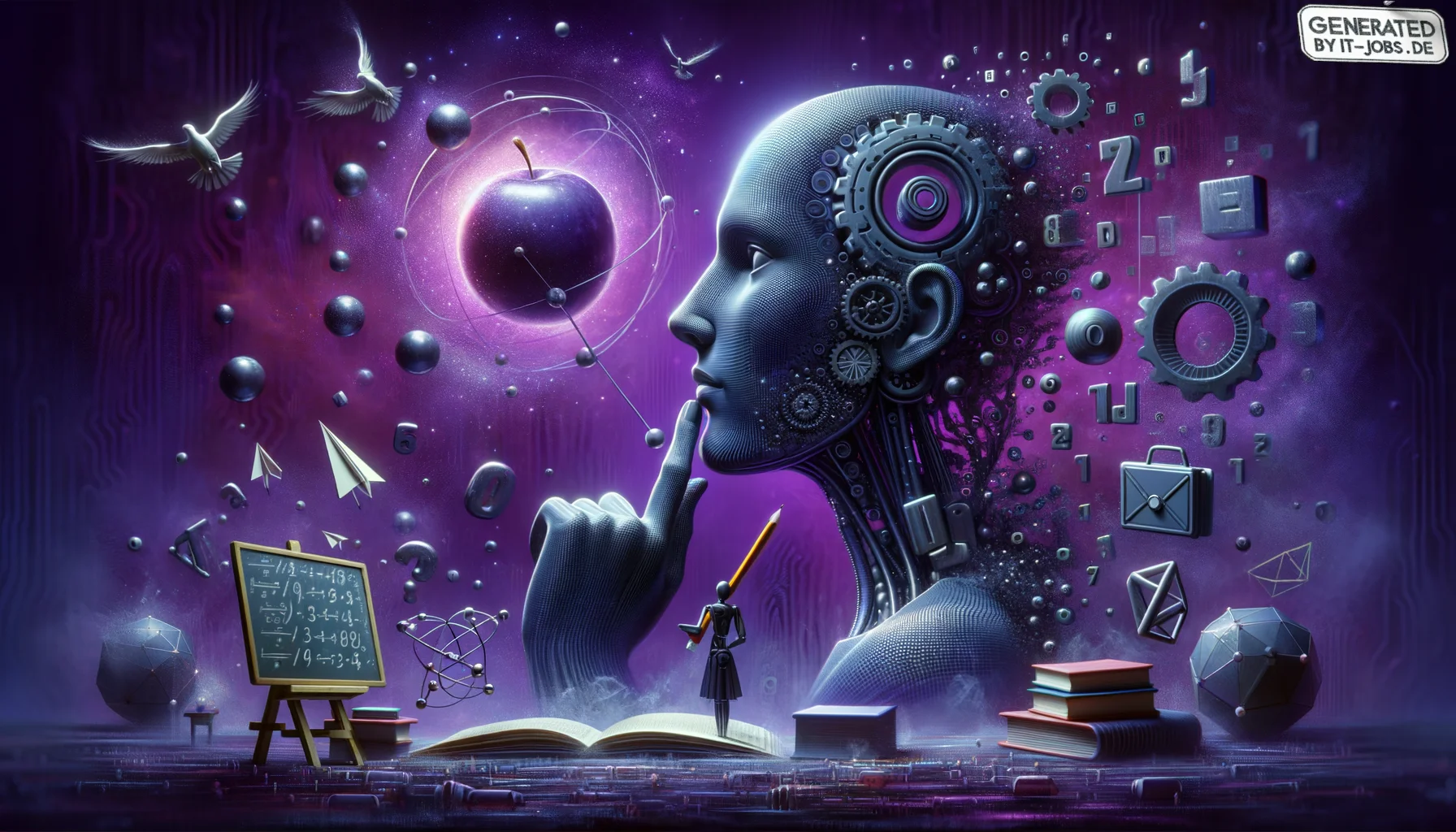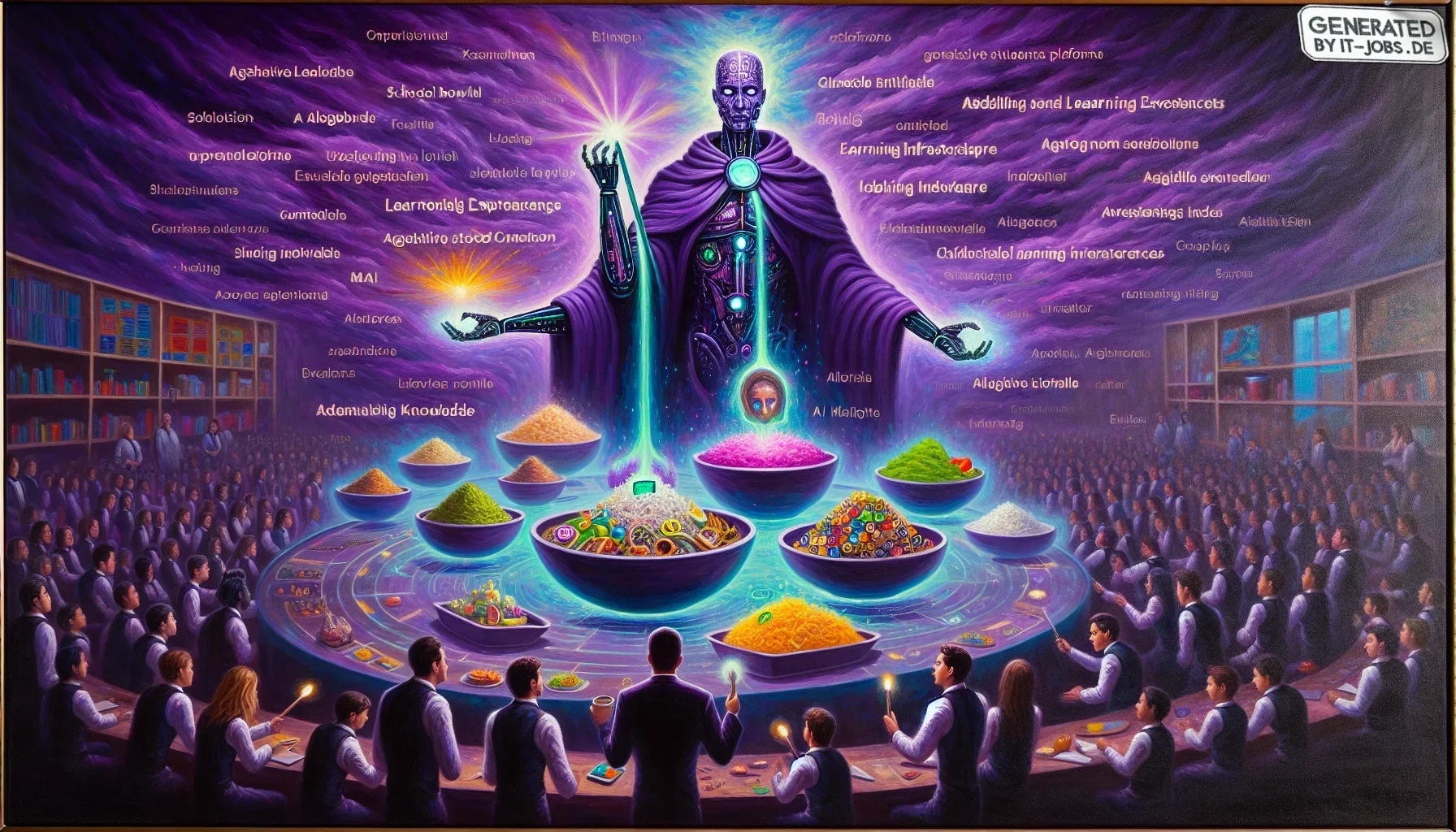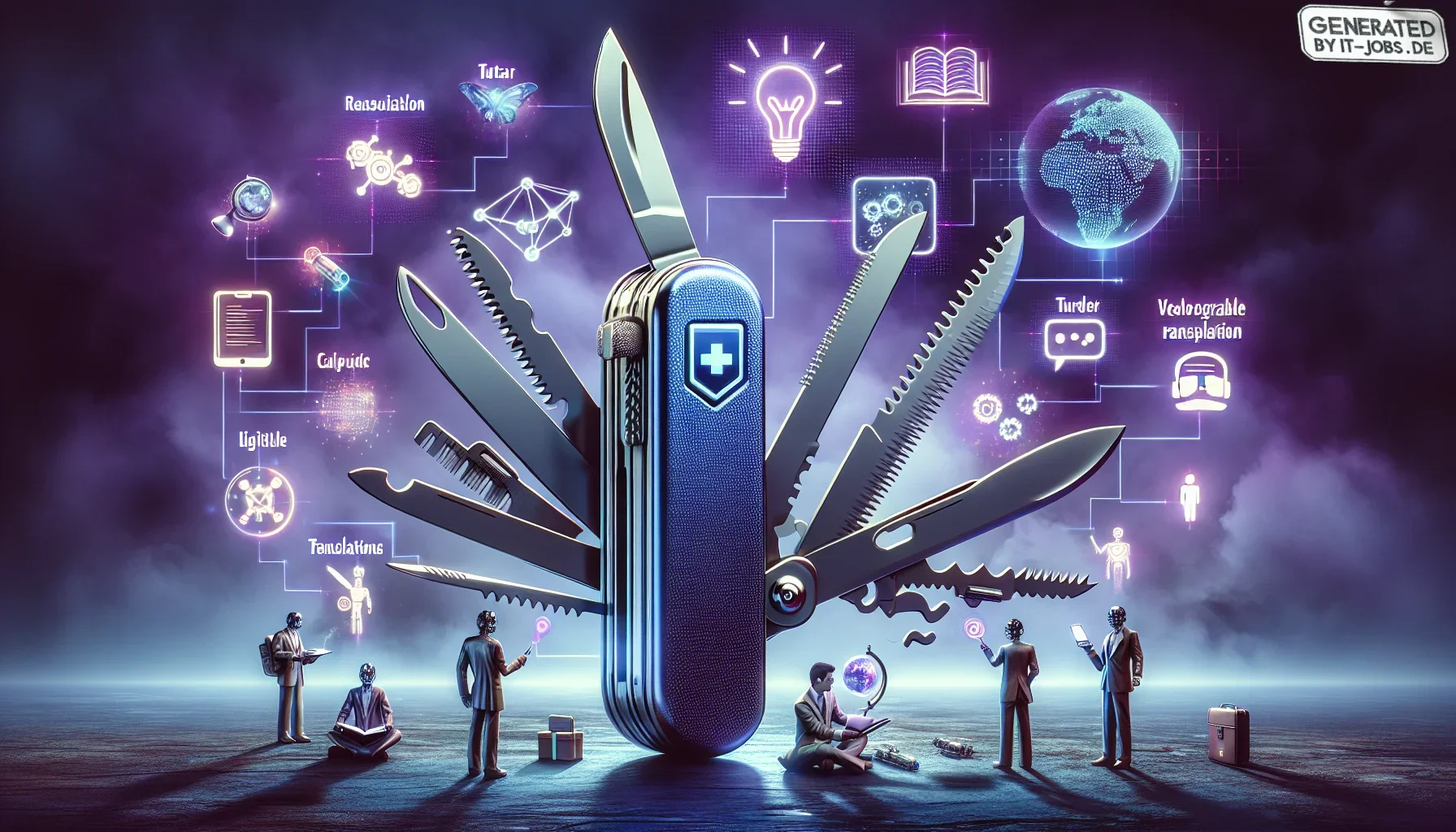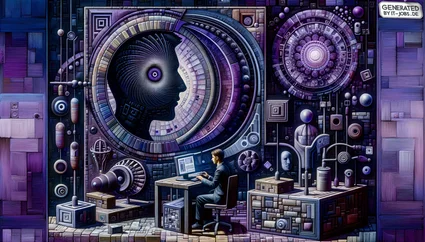
What Is the Role of an Artificial Intelligence Specialist in Education?
Well, until the AI steals my job, at least it can't steal my coffee!
Introduction to Artificial Intelligence in Education
Ah, the marvel of progress! It's almost enough to make us nostalgic for the days when calculators were the rock stars of the academic galaxy. While those little number-crunching marvels dazzled us with addition and multiplication, today's Artificial Intelligence (AI) has catapulted us into an interstellar journey of educational transformation. This isn’t just a remake—this is the digital revolution’s psychedelic symphony, complete with AI wearing a conductor’s hat, orchestrating modern classrooms.
In the traditional classroom setup, education followed the one-size-fits-all strategy like a factory line straight out of a Charlie Chaplin flick. However, AI swoops in like the educational fairy godmother, sprinkling a digital cocktail of personalization, creativity, and intelligence over curricula. All of a sudden, your learning schedule is being curated as meticulously as if it were for a Netflix marathon—yes, even Hamlet is wondering, "To AI or not to AI?" Spoiler alert: the AI's got this covered.
Imagine AI in education as your enthusiastic, tireless tutor, the kind that doesn’t need coffee breaks. This tutor never loses patience and knows exactly what you need to ace that algebra test. Across the digital expanse, machine learning algorithms are dissecting and analyzing educational data as expertly as a chef preparing the finest sushi. They craft individualized learning paths that make one-size-fits-all seem so, well, last century.
The genesis of AI in education reads like a saga—beginning with the advents of computer-aided instruction in the 1950s when computers needed entire rooms and a regiment of technicians just to turn on. Fast forward to the 2000s, teachers were raising eyebrows as AI-driven learning suddenly turned gaming into academically legit territory. Today, the evolution is nothing short of Shakespearean, bringing AI applications into arenas we never dared dream of.
Our current AI education landscape is thriving with sparkling jewels of technology: adaptive learning platforms adjust content in real-time to meet unique learning preferences, while AI tutors are more reliable than Mary Poppins on a dash of digital steroids. They’re merciless to procrastination when it comes to serving students—24/7 and without a spoonful of sugar, mind you.
But fear not, courageous educators! Despite the AI whirlwind, your roles are far from obsolete. Wielding AI tools, you become the guiding Sherpas scaling the educational Everest. Students, under your sage guidance, summit unique peaks of potential and develop competencies they didn’t even know they had. As long as ethics, empathy, and human interaction remain at the core, AI is not here to steal the spotlight, but rather to illuminate the stage where students and teachers perform. After all, while AI can suggest reading "Pride and Prejudice," it’s still the human touch that makes the magic of learning unfold.
The Role of an AI Specialist in Education
Ahoy, tech pioneers and digital dreamers! Our journey continues into the cosmic cosmos of AI-infused education, where AI specialists tread boldly like intergalactic cartographers mapping this new frontier of learning. Think of them as sorcerers of the silicon sea, wielding code and algorithms instead of wands and potions. They're the architects behind the high-tech curtain, slipping AI tools into classrooms as discreetly as ninjas slipping into the night.
Imagine an AI specialist as a maestro, its baton conducting an orchestra where every note is a data point that harmonizes into symphonies of personalized educational experiences. Their mission, if they choose to accept (and you'd bet they do), is to craft AI-powered marvels resonating with students and educators alike. From creating algorithms that double as learning companions to designing chatbots with the charm of your favorite movie AI—these specialists are the real MVPs behind the mesmerizing curtain of innovation.
The life of an AI specialist is akin to that of an over-caffeinated sleuth. Their days are spent unearthing educational treasures hidden within vast data repositories, crafting analytics like a fortune-teller who forgot his crystal ball at home. As reported in OpenLearning’s blog, these specialists also serve as bridges, forging partnerships between AI tools and educational methodologies—a feat that could rival translating Homer into emoji-speak.
In the vast cosmos of education, an AI specialist’s responsibilities extend beyond just research into next-gen AI technologies and helming educator training missions. They are the multitasking maestros of the tech-ed universe. Well, integrating AI into education isn’t just about spewing code like a manic typing monkey—it’s an elaborate dance of teamwork, creativity, and let’s be real, a sprinkle of technical sorcery. Welcome to the world of AI magic, for lack of a less mystically enchanting phrase.
Key Responsibilities of AI Specialists
In this whirlwind world, AI specialists juggle responsibilities that could strain even a professional juggler's wrists. A primary mission in their quest for educational betterment involves developing AI-driven educational tools tailored to the diverse needs of students and educators. Whether they're programming algorithms clever enough to thrive in a classroom or engineering chatbots designed to make even calculus charming, these specialists construct the digital bridges that link technology and education.
Beyond creating tech wonders lies their role as relentless researchers—not unlike digital detectives, gathering insights that lead to innovations in human learning. They deep-dive into a sea of data, not for lost shipwrecks, but to find trends and formulate predictive models. These efforts allow educators to anticipate and support students' learning needs with precision that's almost telepathic—no crystal ball required.
Another major duty revolves around training educators, serving as benevolent guides to this brave, AI-enhanced world. This involves orchestrating workshops where teachers learn to harness AI tools—think of teachers teaching teachers to train AI teaching assistants, without it devolving into a tech-driven comedic Ex Machina scenario.
Blending education, innovation, and vision, AI specialists reshape learning environments with brushstrokes of technology. They are akin to a modern-day da Vinci but armed with Wi-Fi and a penchant for machines.
Essential Skills and Qualifications Required
“What arcane wisdom must one acquire to become an AI specialist in the realm of education?” you ponder, thoughtfully polishing your virtual monocle. Well, aside from the quintessential flair for drama and a devotion to code, these specialists must wield a veritable arsenal of skills.
Foremost, a stalwart foundation in programming and computer science is vital. In a study spotlighted in 2024 by the Center for Democracy and Technology, skills in Python, R, or Java are highlighted as imperative for spinning the digital web of academic achievement.
Moreover, prowess in data analysis and machine learning tops the list. The skills needed to create, evaluate, and regulate complex algorithms are akin to wielding a lightsaber with Jedi-like finesse—minus the self-inflicted garment-cutting incidents.
But technical acumen is rudderless without the compass of communication and collaboration. Proficiency in educational psychology and learning theories, "teacher speak," if you will, is equally crucial. Part of an AI specialist’s role involves teamwork to ensure that AI integration speaks not just code but education too. Consider it akin to translating Java into Shakespeare—simple, right?
Lastly, an insatiable hunger for lifelong learning, infinite creativity, and brilliant problem-solving are essential. If you’re charting a path to this career, envision being the chosen one in an epic saga where knowledge truly equates to power. Bon voyage on your AI adventure!

AI Technologies Revolutionizing Education
Buckle up, fellow tech aficionados, as we embark on a whirlwind tour through the electrifying landscape of education, where Artificial Intelligence (AI) has been the Gandalf guiding us from the modest shire of chalkboards to the shimmering metropolis of digital classrooms. AI, with its transformative wand, is evolving traditional teaching into a dynamic interaction, a Hogwarts-like wizardry minus the sorting hat confusion. As we celebrate innovations spearheaded by visionaries like OpenLearning and Workday, let's acknowledge the role of AI as it paves new paths of educational exploration—think Roomba, but with virtual cobblestones and significantly fewer tangled cables.
Adaptive Learning Platforms and LMS Integration
Picture a classroom where lessons don't come in a cookie-cutter mold but are as customizable as your favorite burrito bowl—extra guac, anyone? This isn’t a culinary fantasy but the tangible reality offered by AI-driven Adaptive Learning Platforms. Imagine these platforms as suave spies, seamlessly infiltrating learning management systems (LMS) with a license to thrill and educate—an operation entirely above board, we assure you.
At its core, adaptive learning deploys algorithms that digest a buffet of student data, metrics, preferences, and performance patterns. These algorithms craft a bespoke educational experience for each learner, effortlessly adjusting real-time content delivery like a jazz band adapting its rhythm—whether in the swing of algebraic symphonies or the bebop of philosophical discourses. Need proof? Schools tapping into platforms like DreamBox and Classcraft don’t just report an uptick in student engagement, but they often encounter uproarious class participation levels rivaling the excitement of a cat at a laser show (note: actual cats may vary)
In this sophisticated setup, educators wield AI-enhanced LMS tools to navigate the ever-evolving intricacies of academic life sans the mediocrity of mundane admin work, thereby rejuvenating their roles. Yet, in this triumphant symphony, we pause for a somber flute solo for the erstwhile 'P.E. Teacher turned IT admin’ (Bob, your tenacity is appreciated as always).
AI-Driven Chatbots and Virtual Tutors
Now, dear reader, let us entertain the whimsical vision of asking your regular, caffeine-reliant teacher questions like "What was the significance of the Magna Carta?" or "How can I use Newton's laws to dodge gym on Friday?" without disrupting their sacred coffee interlude. Enter, AI-Driven Chatbots and Virtual Tutors, designed to revolutionize your academic inquiries while leaving teachers’ caffeine habits unchecked.
These digital wonders zoom to life, superhero capes optional, capable of providing instantaneous assistance underpinned by advanced natural language processing (NLP) smarts. With platforms like Google's 'Socratic' and the ever-perky 'Gradescope', alongside noble partners like ChatGPT, students traverse questions with ease, from the nuances of Shakespearean sonnets to the elegance of Fermat's Last Theorem—replete with virtual tea for contemplation.
But what about the dreaded 'Red Ink of Doom,' euphemistically known as assignment feedback? Never fear, our virtual tutors offer constructive guidance without shrinking into submission, thereby transforming essays into seminars and assignments into tantalizing puzzles. On the technical side of the divide, AI is often found giggling in server rooms, mocking our prehistoric notions of supervision, all while upholding harmony like a seasoned feline whisperer would pacify a room full of kittens.
As cuddly and charismatic as AI may be, remember it is a team player, always the Watson to our educational Sherlock Holmes. So, next time you ace an exam, channel your inner gratitude to that chatty bot, who heard your cries for help in the cloud. With AI technologies sprawling their digital savvy across our educational frontier, progressive learning arches forward, replacing tedious tomes with gales of laughter and heightened engagement. All aboard the spaceship aptly named Education 2.0—our voyage to brighter, dynamic skies awaits!
Benefits of AI in Educational Outcomes
Let's put on our virtual reality headsets and dive into the matrix of educational possibilities, where Artificial Intelligence (AI) is like an IT hero armed with algorithms saving classrooms from the clutches of monotony. Say goodbye to chalk dust and monotonous lectures, and hello to a learning experience that's as personalized as your coffee order at that fancy artisan café. "But why the hype?" you ask. AI is revolutionizing education with the flair of a Python coder who finally fixed that stubborn bug.
One of the most astonishing feats of AI in education is its ability to personalize learning experiences. Gone are the days when students sat in regimented rows, dotting i's and crossing t's at the same pace. Instead, AI resembles a Spotify playlist for education, curating personalized learning journeys based on student preferences, affinities, and even that random knowledge about llamas they somehow aced in a pop quiz. Adaptive learning platforms employ AI algorithms to tune the tempo just right, ensuring that students are neither snoozing nor breaking a sweat trying to keep up.
But brace yourself, because AI isn't stopping there. It's disrupting traditional assessment like a disruptor beam from the Starship Enterprise, making grading lags vanish into the digital ether. Forget waiting an eternity for term paper grades (which half the class buried in despair on the syllabus). With AI's knack for instant feedback, students can spot their areas for improvement faster than you can say, "Error 404." Imagine the joy of handing in an assignment and receiving feedback quicker than your favorite meme garners likes on social media. Teachers might start wondering why AI wasn't their lifelong learning companion all along!
Of course, AI isn't just a boon for students. Educators, too, find themselves beneficiaries of this algorithmic renaissance. With AI swooping in to automate mind-numbing tasks—like grading and juggling meticulously recorded attendance—it liberates teachers to focus on their real passion: teaching. It's akin to developers finally getting to craft code without drowning in QA tasks. Teachers can now engage more with learners, adopting roles of creative guides rather than vessels of dress-code enforcement (though hats off to school laptops making sure you’re not in PJs during class!).
Moreover, AI champions educational accessibility. Is language a barrier? AI’s translation tools instantly adapt materials for non-native speakers. Do courses need to be inclusive? AI seamlessly converts text into speech, opening educational doors for those with visual impairments or turning lessons into a dynamic podcast. If there were a Nobel Prize for bridging educational divides, AI might just have cleared its trophy shelf.
Whether you're a university using AI to predict which students might need a helping hand or AI tutors working like academic elves guiding midnight insights, AI transforms learning outcomes with style. True, it can't resolve every educational hiccup, like finding a campus parking spot (are those elusive spots reserved for unicorns?), but AI's impact on educational vitality is undeniable. So, while AI might not be getting its teaching certificate just yet, it's certainly becoming the favorite teacher assistant sweeping across global classrooms. #AIinEdFTW!
Personalized Learning
Imagine a world where the educational conveyor belt isn't one-size-fits-all. With AI, that world is not just imagined—it's our new reality. AI's algorithms work behind the scenes, masterminding a personal tutor that knows the rhythm of your learning pace, strengths, and stumbles. Say goodbye to being boxed into the same learning pattern as everyone else; it's a tailor-made educational experience!
Adaptive learning algorithms continually assess and tailor content to each student, akin to a dynamic jazz composition that tunes itself to the musicians' skills. For one student, algebra might be improvisational bliss, while calculus demands a deep dive. These systems adjust content seamlessly, ensuring students are neither bored with déjà vu topics nor overwhelmed by the unexplored. Research from the National Bureau of Economic Research bolsters this—students engaged in personalized learning have seen test score boosts and enhanced skills retention (Source: NBER). Education efficiency isn't just theoretical; it's a verified hit!
Instant Feedback and Assessment
Assessing traditional exams has met its digital match in AI. That suspenseful wait for exam results, which feels as eternal as waiting for the next tech gadget unveiling, now fast-forwards to the flash of timely feedback. AI-driven tools offer a rapid assessment that’s faster than the reflexes of your favorite Dota hero—minus the rage quitting.
Gone are the days of educators' living nightmares of buried piles of papers requiring scoring. AI's swiftness and precision set a new standard, bringing educators and students a well-deserved sigh of relief. Instead of trawling through layers of annotations, students receive feedback when their learning brain is still warm and receptive. Any confusion? AI promptly identifies and suggests solutions, offering explanations that enlighten rather than daunt—a new era of learning and cognizance dawns.
Enhanced Access and Inclusivity
AI doesn't spotlight only those versed in zeros and ones; its brilliance unfurls to ensure education crosses digital bridges of inclusivity. AI platforms, with their nifty translation capabilities, empower students from different linguistic backgrounds, leveling barriers that might have hamstrung learning before.
For students with disabilities, AI's adaptive technology is a game-changer. Text-to-speech tools lend voice to educational content, providing access to visually impaired learners, while they shift perspectives for those navigating auditory challenges. These AI-powered wonders resonate with universal design learning tenets, fostering educational participation and excitement for every learner, regardless of circumstance.
AI, therefore, is not merely an enhancement—it's a portal to a new inclusion frontier. And as our minds dance across intricate algorithms, a veil of restrictions lifts to reveal boundless opportunities. Who’d have thought algorithms could switch on such avenues of opportunity?
Challenges and Ethical Considerations in AI Implementation
Alright, IT maestros, it's time to delve into the labyrinthine network of ethical and operational speed bumps lurking in the application of AI in education. Think of it as navigating through the original Pac-Man game, but instead of cherries and ghosts, you're dodging data breaches and algorithmic partiality. Implementing AI in educational systems isn't merely a matter of setting up a mind-blowing hologram showcasing the timeline of quantum physics. It's more like carefully handling a spiky cactus—there are ways to make it work beautifully, but handle it without care, and ouch!
Let's start by shining a spotlight on privacy and security. You see, in the age of 'Data is the New Data' (or something like that), education-oriented AI systems are mini-Quicksilver bots gathering high-specificity student info—tracking everything from how you aced that Byzantine history quiz to how frequently you snack on Cheetos during calculus marathons. Yes, harnessing this data can lead to magnificent, personalized educational experiences. Still, just like Uncle Ben (Parker, not rice) would say: "With great data comes great responsibility" (or something like that).
Educational institutions must ensure strict adherence to data protection laws like GDPR and transform those dry-as-dust privacy policies into something that even grandma would understand, not some cryptic prediction of impending doomsday. Trust isn't built in an Orwellian dystopia but in transparent data management practices—a truism that Cambridge Analytica left etched in the minds of many policy-makers. TL;DR: Protect the data, secure the trust.
Next in our rogues' gallery is algorithmic bias. Picture this: An educational AI predicting student success based on a set of previous data that's as one-sided as a sitcom's laugh track. That's your cue to scream in horror, "Skynet's judging me by ancient data again!" Addressing these June-bug biases (that's right, as in—you-should-fix-it-now) necessitates vigilant oversight and diverse data pools. That means ensuring that AI systems are a corridor of opportunity for everyone—regardless of who can even describe 'pseudocode'.
Enter the age of reliance—ah, the dreamy thought of AI automating pesky chores. But hey, be cautious. The idyllic vision of educators as Zen-like guides, focusing on nurturing students' experiences instead of battling the monstrous task-monolith, could morph into dystopian scenarios where educators become mere robot-babysitters. Balance, as my Jedi friends would say, is the key here. AI should be your trusty sidekick (your Robin) not the sole custodian of academic insights.
Cue in the recurring fear theme: Job security. AI, despite its benevolent intentions to liberate educators from the Sisyphean treadmill, raises alarms of vanishing educational roles, painting classrooms with mechanical stewards rather than human storytelling dynamos. However, hats off to envisioning AI as merely a tool—empowering educators to unleash their inner magic, guide, motivate, and possibly debate over the philosophical impact of losing the time-honored tradition of chalkboard cleaning.
In summation, wrangling these challenges isn't merely a necessity but a cosmic chance to mold a future where AI complements learning rather than complicates it. Tackling privacy issues head-on and curbing biases while promoting human-centric learning environments ensures that educators can leverage AI to cultivate innovation and inspiration. Remember, even in a matrix of neural networks, it is our uniquely human touch that lights the brightest educational paths, a feeling familiar to seasoned gamers when they stumble on a cleverly concealed Easter egg.
Privacy and Security Challenges
Data privacy and security have risen to the forefront in the context of educational AI, underscoring the imperative for robust protection strategies and transparent data practices. Building trust with stakeholders is vital, ensuring that the digital education landscape is both secure and user-friendly—it’s not just about setting up fire-rated doors but about cementing invisible fortresses. Akin to a trusted locksmith entrusted with the keys to the data castle, stakeholders must navigate these challenges with precision.
Addressing Algorithmic Bias
Algorithmic bias stands as a significant concern, with AI systems occasionally serving as unintentional amplifiers of existing prejudices. Prioritizing fairness and transparency within algorithms is crucial to guaranteeing that AI-driven educational tools uphold equitable learning opportunities for all students. Picture this as inviting code to a global village potluck—embrace the diversity and rid the table of any recurring algorithmic ‘salads’ that may have expired centuries ago.

Future Trends and Innovations in AI Education
Ah, the future: the domain we’ve all imagined would have jetpacks, instant pizza, and robot housekeepers. But let's focus on what really keeps that high-tech title intact—the genius infusion of AI in education. Spoiler alert: it’s less about teleportation to math class and more about trendy innovations that make educational dreams a touch more electrifying. So fasten your seatbelts, or maybe just grab your future-proof VR headsets, as we delve into a realm that makes even Marty McFly look twice.
AI in Hybrid and Lifelong Learning Environments
Picture AI as the Swiss Army knife of education—it can seemingly do it all. The integration of AI into hybrid learning environments is akin to the human fallback phrase, "I know a guy." One minute it's handling in-person sessions, and the next, it's executing online lessons without missing a beat, much like keeping tabs on your episodic journey across streaming platforms. Honestly, Netflix could take notes.
AI's adaptability offers educators the flexibility to design hybrid models suiting diverse learning needs, turning what once seemed like an unfeasible lineup into a harmonious educational fantasy team. You could say AI allows educators to craft the perfect lesson lineup like they're selecting players in a sports draft. Knowing each student's needs and configuring the learning path in real-time, it’s like tailoring a playlist that automatically adjusts based on the mood—only here, the mood is your academic performance.
But wait, there's more! AI is booting up the lifelong learning revolution. Imagine AI career coaches that surpass even those overzealous inbox LinkedIn referrals. With machine learning-enhanced MOOCs, studying feels less like deciphering Da Vinci's notebooks and more like having a reliable GPS for your career path. With AI capable of emotion-tracking, designing personalized learning pathways based on your current mood, interest, or whether you had coffee that morning is becoming a reality. The future, my friends, is looking as bright as a well-coordinated jug of AR sunglasses!
Innovative AI Applications for Inclusivity
Gone are the days when AI was just about blah, blah, efficiency. Today, it's evolving into a vital ally for inclusivity and accessibility. Visualize it as a benevolent bouncer who lets knowledge seekers in instead of keeping them out. The magic trick on the table is AI’s ability for real-time translation, effortlessly breaking the linguistic Ice Age faster than C3PO ever could. The enabling of a global learning village is on the brink of reality, with AI translating lessons instantly, or should I say 'Bibbidi-Bobbidi-Boo!' across diverse cultures. No more basic language learning apps. Imagine real-time conversations with instant understanding—a universal translator for education.
Moreover, AI-powered assistive technologies are to learners with disabilities what Alfred is to Batman—essential sidekicks customizing educational content to meet a variety of physical and cognitive needs. From voice commands and beyond, all the way to interfaces that respond to gaze tracking, these tools are superheroes ensuring that no child is adrift on this epic journey of learning.
Thinking of AI as a mind-blowing yet pragmatic tool helps it evolve—no longer a mysterious buzzword but a transformative furious increase of power bridging the gorge between the privileged learners and everyone else. Rock concerts might remain exclusive, but access to education? AI's crafting a future where it's open and available, minus the mosh pits and exorbitant souvenir shirts.
As this journey unfolds, AI stands to be the guiding star, leading us into an era of accessibility and opportunity for all—a true game-changer redefining global knowledge sharing. Not quite there yet, but hold on to your fedoras because the future of AI in education looks like one thrilling theme park ride. Onward! 🎢🕶️







